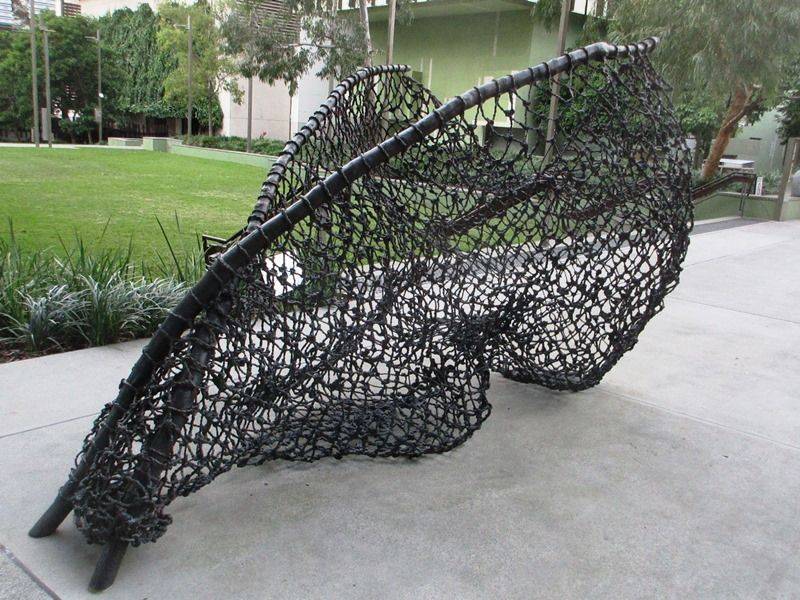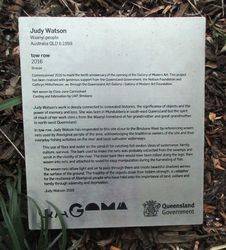
"Tow Row"Print Page 
The Gallery of Modern Art (GOMA) is an art museum located within the Queensland Cultural Centre in the South Bank precinct of Brisbane, Queensland, Australia.
GOMA, which opened on 2 December 2006, is the largest gallery of modern and contemporary art in Australia. The building was designed by Sydney architecture firm Architectus.
Location
| Address: | Stanley Place, South Brisbane, 4101 |
|---|---|
| State: | QLD |
| Area: | AUS |
| GPS Coordinates: | Lat: -27.473123 Long: 153.018636 Note: GPS Coordinates are approximate. |
Details
| Monument Type: | Sculpture |
|---|---|
| Monument Theme: | Culture |
| Sub-Theme: | Community |
| Actual Event Start Date: | 02-December-2006 |
| Actual Event End Date: | 02-December-2016 |
| Artist: | Judy Watson |
| Monument Manufacturer: | UAP (Brisbane, QLD) |
Dedication
| Approx. Monument Dedication Date: | 2016 |
|---|
Judy Watson
Waanyi People
Australia QLD b. 1959
Tow Row
2016
Bronze
Commissioned 2016 to mark the tenth anniversary of the opening of the Gallery of Modern Art. This project has been realised with generous support from the Queensland Government, the Neilson Foundation and Cathryn Mittelheuser, AM, through the Queensland Art Gallery | Gallery of Modern Art Foundation.
Net woven by Elisa Jane Carmichael
Casting and fabrication by UAP, Brisbane
Judy Watson`s work is deeply connected to concealed histories, the significance of objects and the power of memory and loss. She was born in Mundubbera in south-east Queensland but the spirit of much of her work stems for the Waanyi homeland of her grandmother and great-grandmother in north-west Queensland.
In Tow Row, Judy Watson has responded to this site close to the Brisbane River be referencing woven nets used by Aboriginal people of the area, acknowledging the traditional owners of the site and their everyday fishing activiites on the river and local saltwater waterways.
This use of fibre and water as a conduit for catching fish evokes ideas os sustenance, family, culture, survival. The bark used to make the nets was probably collected from the swamps and scrub in the vicinity of the river. The inner bark fibre would have been rolled along the legs, then woven into nets and attached to wood for easy manipulation during the harvesting of fish.
The woven nets allow light and air to pass through them and create beautiful shadows across the surface of the ground. The fragility of the objects cloak their hidden strength, a metaphor for the resilience of Aboriginal people who have held onto the importance of land, culture and family through adversity and deprivation.
Judy Watson 2016






